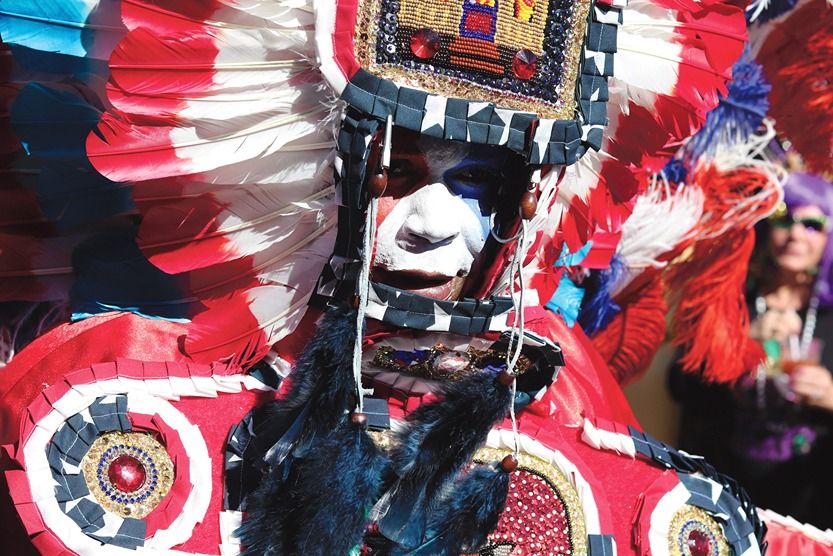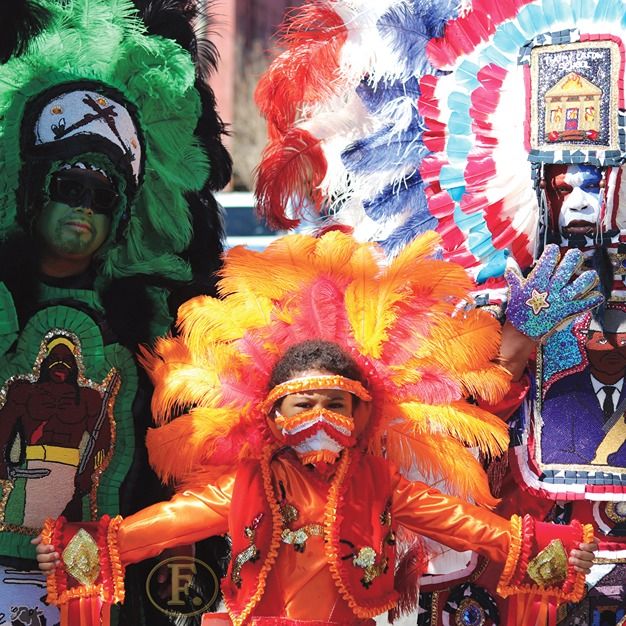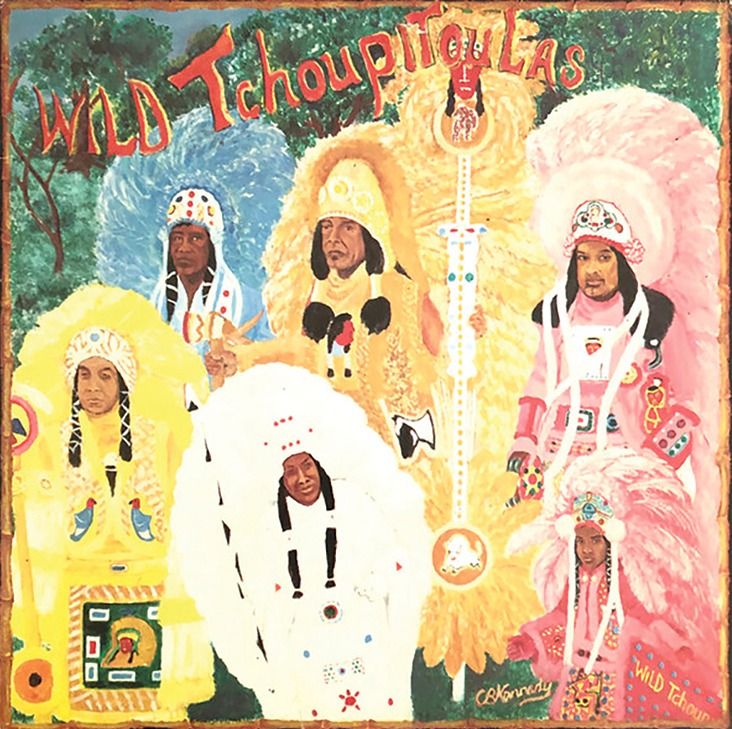Super Sunday in the Streets
Aaron "Flagboy Giz" Hartley of the Wild Tchoupitoulas is a Renaissance man—he raps, produces, plays instruments, does beadwork at an expert level, and represents his tribe on the streets, in his music, and through advocacy and grant writing.
He can be fierce, when fighting for what he loves, and masking, but he's also got a smile so big, it won him the title of Homecoming King, back in his University of New Orleans (UNO) days. It was an honor to sit down with him to discuss this year's Super Sunday, rivalries between tribes, his last two albums and his upcoming ones, and what it means to be a Flagboy.

Interview with The Wild Tchoupitoulas' Flagboy Giz
Where Y'at (WYA): What is Super Sunday, and why is it so important?
Flagboy Giz (FG): Super Sunday is a day put on by the Indian Council. You see the Mardi Gras Indians debut their suits on Mardi Gras Day, and you see them on St Joseph's night. Those days can't be changed. They're set in stone. It could rain, and you might not see us, 'cause we're out there looking for each other. Super Sunday is different. We pick the day and if it rains out, they reschedule it. It's your only chance to see an organized parade [of Mardi Gras Indians and] of all the artwork and all the heartwork walking right past you.
WYA: Let's talk about the Holy Trinity of the Big Chief, the Spyboy, and the Flagboy.
FG: The Big Chief runs the tribe; makes all the decisions. He's in the back. He's singing with the second liners and everybody else. The Spyboy is in the very front. He meets all the Indians first. He usually has the lightest suit. He's up there doing all the dancing, with all the weapons, making sure the meet goes down. He organizes the meet [between tribes]. The Spyboy lets the other Spyboys know what's coming, or it could be trouble. It could be anything the Spyboy wants. Then, the Spyboy sends the signal back to me, the Flagboy. I'm in the middle of both the Chief and the Spyboy. Sometimes I got Indians in between us. Sometimes I got Chiefs, Wildmen, Third Chief, Second Chief, Medicine Man, Third Queen, etc., and I'm back there, at guard, and I'm supposed to have the name [of the tribe] on me, so everybody knows who we are. I'm supposed to be pretty. People look at me and they see the "Wild Tchoupitoulas."

WYA: Can you talk about the infamous rivalries between tribes?
FG: If you like New Orleans Culture, you want to be the best at everything. The clubs want to be the best; the musicians, they talk trash; the little children, they try to outdance each other; the bands try to be louder than each other in the high schools; people at the second lines try to out dress each other, and all this Indian stuff, on every level, it's like that. "When it comes to creativity, I'mma beat y'all. When it comes to music, I'mma beat y'all. Get in the back seat."
WYA: I feel like a big part of "the competition" is really just about one-upping yourself in artistry. On the epic track you did with Mannie Fresh, "Uptown" you say, "Every year my suit gotta be harder. Sewing all year for that morning glory." That's a lot of pressure, to go bigger, be better every year.
FG: I'll always be talking trash about creativity. You gotta make sure, every year, that they all come back and that it's gonna be prettier and prettier, so you don't have to worry about if this culture is going to die away. I don't read the comments. When people tell me they like what I did I be like, "Yeah, yeah, wait 'til you see this next thing." I also try to do a little one up. I can't wear the same patch twice. There's too many cameras on me. I ain't worried about them. I'm worried about being the hottest Indian to ever put New Orleans on the map. I need people to look at this and be like, "This is the coolest culture."
WYA: On the same track, you mention that your suits are "under contract at museums." These were made to fit your body, so it must feel strange for them to be on tour without you in them.
FG: Sometimes I get, like, "Damn, I can't believe these people want this. I didn't make this for display. I made this just for Carnival." People always ask, "Why don't you sell this?" I didn't make this to sell it. I don't want nobody to have it. I don't want nobody to wear it. I wear them around the world but I don't know about just putting them on a stand. Maybe I'm changing my mind about it. I don't know yet.
WYA: On Mardi Gras 2021, you came out with your first album Flagboy of the Nation and then this year, you released I Got Indian in my Family. Tell me about them.
FG: Each one is a unique piece of Indian Culture music. I don't think all my albums will sound like that. [I Got Indian in my Family] was something for that suit, for the ritual of burning up the suit, for the ritual of talking out the trash. The next suit's gonna be totally different. The theme of the music's gonna change. The next suit after that is gonna be totally different and the music has to change. The artistry has to improve with the sound. The music has to reflect what I'm presenting.
WYA: As a musician, I'm amazed by this goal you've set of coming out with an album every year, to go with the suit.
FG: I'm freestyle, so most of the last album was done in five days. After Mardi Gras, Super Sunday, and St. Joe, you get enough material to make an album. If it rains, it'll be an emotional album. You can't really sit on an album for too long. We have [my single] "We Outside." That ain't really going nowhere but you gotta have new material. I'm thinking about making an album that sounds traditional, or I'm thinking about doing more with my tribe, the Wild Tchoupitoulas. It can't just all be Flagboy Giz. My tribe is featured on "We Outside" [and several other tracks on the last album]. What about a new, up-to-date Wild Tchoupitoulas album? That's the kind of thing I'm thinking of.
—----------------------------------------------

Listen to Flagboy Giz on all streaming platforms or head to your favorite local record store for a gorgeous custom vinyl version. At FlagboyGiz.com, you can donate to the creation of his next suit, which is an incredible process to be a part of. As a musical bonus, check out 1976's The Wild Tchoupitoulas' self-titled album, featuring the Neville Brothers and some of our all time best local musicians. It's a piece of Mardi Gras Indian New Orleans culture that is still very much alive and worth a spin.
—----------------------------------------
The Wild Tchoupitoulas has a Rich History
Named after Tchoupitoulas tribe, the group formed in the early 1970s by George "Big Chief Jolly" Landry. Allen Toussaint produced an album in 1976 which included Landry's nephews, the Neville Brothers.

